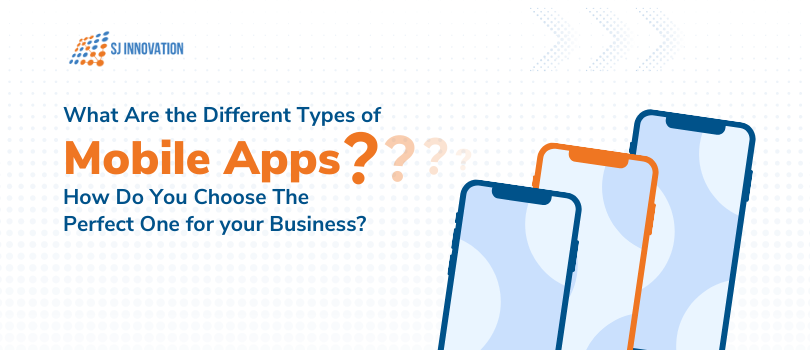What Are the Different Types of Mobile Apps? How Do You Choose the Perfect One for your Business?

Take a moment to look up from your phone for a while. What do you see? Almost every person is glued to their smartphone right? There are over 6.3 billion smartphone users globally, it’s not surprising why the mobile app industry is flourishing.
By 2026, mobile users will escalate to 7.16 billion. What exactly is this obsession and craze that makes it difficult for people to look up from their screens? It’s the different types of mobile apps available for almost everything and anything nowadays. Did you know that almost 88% of mobile time is spent on apps? Given how hooked people are to their beloved apps, it’s a marvelous opportunity for your business to take advantage of them.
Don’t know where to begin? That’s exactly what we are here to talk to you about today! You can start by checking out this introduction to the world of mobile application testing.
Now, here is a guide on the various types of mobile applications and how to pick the perfect one for your business.
Kinds of mobile apps based on technology
Depending on the category used to code them, there are 3 kinds of mobile apps for businesses. These are:
Web apps: Designed to function on any mobile device or Operating System (OS) and are more reactive than websites. These apps are run on the web and are delivered on web browsers.
Native apps: Designed to be used on a particular OS or platform.
Hybrid apps: While these apps are a blend of web and native apps, they have the ability to possess their own icon and they can also be downloaded from Play Store or the App Store.
Want to know more? Let’s take a look!
Web apps
These apps are internet browser-enabled applications which means you can access these apps through the web browsers on your mobile device. You do not need to install or download these apps on your mobile so they do not use up much of your storage, RAM, and other hardware resources. When you download them, it gets saved as a bookmark. Also, since these apps run through the web/mobile browser, they do not gain access to the device’s functionality.
Advantages
- It reduces development costs as you don’t have to customize to an OS or platform
- No space is consumed on your device memory since downloads are not needed so maintenance also becomes easier
- Deployment and distribution is also faster since approval from app stores is not needed
- It comes with multi-platform support
Native apps
Built specially for a mobile device’s OS, native apps are designed specifically for either Apple iOS, Google’s Android, or Windows phone. You cannot mix these apps with any other devices and expect them to function seamlessly. These apps also connect with the device’s hardware directly so you obtain access to features such as Bluetooth, camera roll, NFC, phone book contacts, and more.
Advantages
- These apps come with a smooth and fast UI which make them extremely responsive and dependable when it comes to performance
- These apps make it easier to work offline while coding is also more efficient since they utilize fewer hardware resources
- An optimized customer experience ensures since you have access to native device functionalities
- You can take advantage of push notifications to obtain the desired action and find ways to use the app better
Hybrid apps
The benefits of mobile app for business can be witnessed in hybrid apps. They have the same look and feel like native apps. Since, as mentioned before, they are a blend of native apps and mobile apps, they are also known as ‘cross-platform apps’. Other than this, they come with a responsive design, the home screen app icon, may come with the functionality of working offline and performing at a fast rate. Code shareability is the only similarity between a cross-platform app and a hybrid mobile app. These apps are effortless to develop, deploy updates and offer multi-platform support.
Advantages
- It is faster and more cost-effective to build a hybrid app as compared to a native app
- These apps are perfect for countries that come with slower internet connections
- There is less code to maintain since they use a single code base
- These apps offer a consistent user experience
How to choose the ideal app for your business needs?
There are many deciding factors that can help you pick the ideal app for your business’s needs and wants.
Looking for a fast and consistent app?
For a stable and consistent app that delivers an impeccable performance, it’s better to go in for a native app. It offers stability, customization, and speed that drive performance desirably.
Go for a native app, for:
- Impeccably secure apps
- Easy user interface and user experience
- Third-party integrations support
- To utilize the hardware present in mobile devices
- A long term investment
Want an app as soon as possible?
If you need an app without wasting any time, it’s vital to go in for a mobile application type known as the web app. The one codebase will cut the time it takes to develop the app drastically. Your users will also already possess what they require to use the app and that is a mobile browser of course!
Go for a web app, for:
- Seamless third-party integration
- To quickly deploy an app
- When you are on a tight budget
- When your app needs network access
- When you do not have the time for getting approval from applications stores
Don’t have many resources to spare?
If you are searching for an economical and time-efficient way to build a mobile app for small business, you can go in for a hybrid app or even a web app. Using a hybrid app helps you examine the market using a minimum viable product. Users can test this app within just a few months itself and so, you can accordingly decide if you want to build a native version.
Go for a hybrid app, for:
- Its widespread userbase
- Its good performance and usability
- A moderately good budget to develop the app
- Its decent security features
- Third-party integration support
Developing a mobile app for your business is a clever approach to enhance your business sales and obtain targeted traffic. Now that you know what are the different apps and which are the aptest ones for your business, you can go ahead and pick the most suitable one for your growing business. Want to hire a mobile app developer? You can contact our cross-platform and native app development team of professionals today!
Let’s connect
Want to know more in-depth information about the various types of mobile apps along with their various pros and cons? Reach out to our experienced and dedicated native app development team to help you find the best app that drives leads and increases conversion rates in the best way.
Request a Quote Now!

Why Do We Debug Code?

Sjinnovation’s Project Management Process


